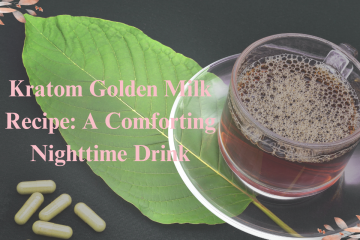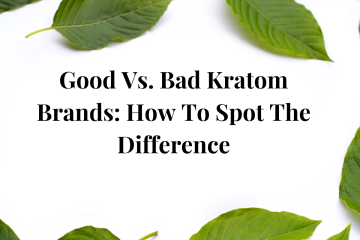As far as herbs and botanicals go, kratom has become a major buzzword—not only amongst botanical enthusiasts looking to buy kratom, but amongst scientists, medical professionals, lawmakers, and federal agencies.
Although kratom has been used in Southeast Asian traditional medicine for millennia, it’s pretty new to the United States, where it has been subject to controversy, misinformation, and political debates.
Popular searches for kratom include both “kratom tea” and “kratom drug,” which illustrate the differences in how the herb is perceived. It’s no wonder why, then, that so many Americans are wondering “What does kratom do?”, “What is kratom used for?”, “What is in kratom? ” and“Where does kratom come from?“
We can’t answer every question about kratom, but if you’re dying to know what kratom is, we’ve got you covered in our transparent, research-based guide to kratom.
What Is Kratom?
So, what is the definition of kratom according to science? Kratom is a tropical tree (scientific name: Mitragyna speciosa) native to Southeast Asia. It is a member of the Rubiaceae family, the same plant family as coffee.
Kratom trees can grow up to 52 feet tall and they maintain green leaves all year long. While kratom has no FDA-approved uses (kratom remains a controversial herb) kratom has held a traditional role in herbal medicine in Southeast Asia.
For millennia, kratom has been grown by farmers in Southeast Asia who harvested its leaves for use in traditional medicine and cultural ceremonies. Kratom is relatively new to the West, where it faces a lack of clinical studies, and is designated as an unregulated herb in the US, where it is regulated at the state level. Kratom is illegal in six states and regulated in five.
Most of the time when people refer to kratom, they refer to kratom (types of kratom products include powdered kratom, kratom capsules, kratom extracts, and kratom tea) that are derived entirely from the leaves of the kratom plant.
Where Does Kratom Come From?
If you’re wondering where kratom grows, the kratom plant grows in the Southeast Asian countries that offer a suitable tropical climate and nutrient-rich soil. Countries where kratom grows include:
- Indonesia
- Thailand
- Malaysia
- Vietnam
- Brunei
- Myanmar
- Papua New Guinea
- The Phillippines
If you’re wondering where kratom products in the US are imported from, almost all kratom for sale in the US comes from Indonesia. Even different kratom strains come from Indonesia, contrary to misconceptions.
What Is Kratom Tea?
There are various different types of kratom products available on the market, including the following:
- Kratom capsules
- Kratom powder
- Kratom extracts
- Kratom leaves
Kratom tea is the traditional form of kratom consumption. In Southeast Asia, people boil fresh kratom leaves to make tea. In the US, many kratom tea recipes can be found online. Kratom is an unapproved botanical with no FDA-approved uses, so you can’t find kratom tea for sale at cafes or restaurants.
How Does Kratom Work, According to Research?
Kratom’s properties come from its alkaloids, of which it has over 40. Different alkaloids have been studied, but exactly how different alkaloids interact is not thoroughly researched. Kratom’s main alkaloids are mitragynine and 7-hydroxymitragynine. Pharmacological and toxicological data for the majority of its alkaloids are limited. Different strains of kratom can have different alkaloid profiles.
Though research on kratom is growing, it remains sparse.
As an unregulated herb, places that sell kratom cannot make claims about kratom’s effects, the benefits of kratom, or other health claims. Studies on kratom are still lacking, and it’s important to note that we are not making any health claims about our products.
What Are Kratom Strains?
In addition to the various types of kratom products available, there are also a variety of different kratom strains for sale.
The different types of kratom strains are basically “recipes” for kratom products, each recipe having its own alkaloid profiles. Kratom strain differences come from the different growing conditions and process methods (i.e. if the kratom leaves are dried in fluorescent light or incandescent light). These differences in kratom production affect the alkaloid profiles of kratom leaves.
Here are the most popular kratom strains available in the US:
There are many myths about kratoms strains, and unfortunately, many kratom vendors have poor quality information on their websites. To read more about the different kratom vein colors and kratom strain names, check out our guide to different strains of kratom in our informational kratom blog.
What is in Kratom Products?
Before you buy kratom, it’s very important to understand exactly what’s in kratom and what isn’t. Authentic kratom powders and capsules contain only pure natural Mitragyna speciosa leaves.
Whether you purchase kratom capsules, kratom powder, or kratom extract, all ingredients should be derived entirely from the natural kratom leaf.
That being said, there are some exceptions to this. Some kratom products include green tea extract, others may contain cacao nibs for flavoring kratom tea. Whatever ingredients are included in kratom for sale, you should be able to access a complete and accurate list of what is in kratom products from the vendor.
Risks of Kratom Contamination or Tampering
While the best kratom vendors will provide you with an accurate, lab-tested list of ingredients in all kratom products that they sell, not all places that sell kratom are authentic or trustworthy.
One reason why kratom has received a bad rap over the years is that since it’s unregulated, it leaves room for inauthentic kratom to be sold at gas stations, headshops, and online. The FDA often recalls and seizes kratom that has been contaminated or adulterated.
For example, in one case, a kratom vendor called “VivaZen Botanicals,” a widespread headshop kratom brand, came under fire for selling kratom that contained phenylethylamine (PEA). Nowhere on their label did this company list PEA in its ingredients for the unregulated botanical, kratom.
Although PEA is found naturally in the body and in dark chocolate, some individuals with varying health conditions are told by their doctor to avoid it. Since it wasn’t on the label, unsuspecting buyers found themselves in the hospital, as is documented in a 2019 study on kratom adulteration in VivaZen.
As a result, VivaZen completely reformulated its kratom product components. That being said, numerous kratom Reddit forum users had shared their bad experiences with kratom from VivaZen, many doubted if the company’s kratom was authentic.
How to Buy Authentic Kratom from Reputable Vendors
If you are looking to buy kratom for the first time, or you want to select a high-quality kratom vendor, here are some tips for finding the best places to buy kratom.
First, always conduct research on the place that sells kratom before you buy from them. If they are an online kratom vendor, try to find as many reviews on them as you can; r/kratom or other Reddit kratom forums often have kratom experience reviews. Look to see if you can find out how long the vendor has been in business, what its customer reviews say, and how involved it is in the kratom community.
Here are some things to look for when determining where to buy the best kratom:
- The product contains completely pure, natural, and authentic Mitragyna speciosa
- Kratom lab tests are available for each kratom strain and product for the buyer to look at or request
- Certified by the American Kratom Association or the Good Manufacturing Practice system
- Qualified the strict Quality Control checks and procedures to ensure its quality and required standards.
- The vendor can trace their kratom directly to its source
- Freshly packaged kratom that is stored and sealed with care
Overall, many of the best kratom vendors online offer kratom for sale in a wide variety of lab-tested strains, or in bulk quantities which they source directly from Indonesia.
If you want to buy kratom nearby in a local store, there are gas stations that sell kratom, as well as headshops, but you’re less likely to find quality kratom for sale at reasonable prices. That being said, if you do want to buy local kratom, check out our articles on Where to Buy Kratom Near Me and Gas Stations That Sell Kratom Near Me.
Learn More About Kratom Online
Hopefully, you’re no longer wondering “what is kratom.” However, kratom information can be hard to come by, so if our guide only left you with more questions regarding kratom, such as “How much does kratom cost? “What are the benefits of buying wholesale kratom?” or “Is kratom legal in Tennessee?” you might want to check out our blog.
If you’re looking to buy kratom that’s fresh and high-quality, we sell kratom powders and kratom capsules in bulk for low prices. We source our kratom directly from farmers in Indonesia, and we lab-test our kratom to assure that it’s natural, pure Mitragyna speciosa.



